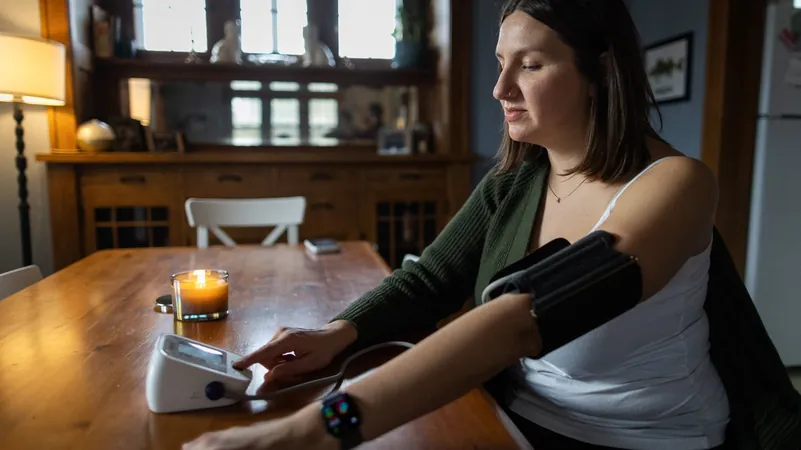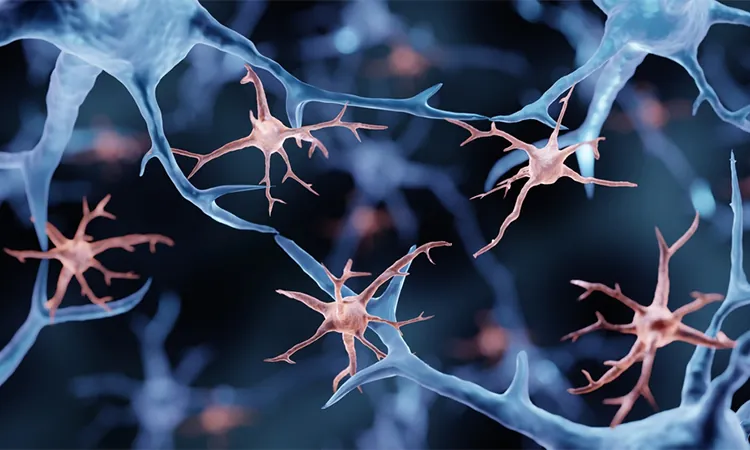
New Home Monitoring Program Empowers New Moms to Control Blood Pressure, Reducing Risks of Severe Health Complications
2024-12-20
Author: Nur
Introduction
In a striking story that highlights the urgent need for better maternal health care, Emily Elsner encountered alarming symptoms just days after giving birth. A severe headache, blurred vision, and swollen legs prompted her to seek emergency treatment, leading to a diagnosis of gestational hypertension—a dangerous condition characterized by elevated blood pressure during or after pregnancy.
The Prevalence of High Blood Pressure in Mothers
High blood pressure disorders complicate the lives of approximately one in seven mothers, significantly raising the risk of severe health issues such as stroke, heart failure, and seizures. Alarmingly, these conditions are the leading cause of maternal mortality in industrialized nations and their prevalence is rising.
Monitoring and Management
During her labor, Elsner’s blood pressure was consistently high, but thankfully, it began to stabilize post-delivery. Nevertheless, her healthcare team emphasized the importance of vigilance, instructing her to be aware of persistent headaches, vision changes, cramping, and swelling—symptoms signaling potential blood pressure complications.
After her emergency visit, she was provided with a home monitoring kit and instructed to track her blood pressure twice daily. Her results were sent directly to her healthcare team via a mobile app as part of an innovative pilot program.
The HOPE-BP Program
This initiative, the Home Observation of Postpartum Elevated Blood Pressure (HOPE-BP), recently launched by M Health Fairview at the University of Minnesota Medical Center, aims to empower mothers diagnosed with hypertension during pregnancy by supplying them with the necessary tools for effective self-monitoring during the critical first six weeks postpartum.
Led by Dr. Bethany Sabol, a maternal-fetal medicine specialist, the HOPE-BP program targets high-risk pregnancies such as those with chronic hypertension or blood pressure issues. The program has already served around 460 women, highlighting its importance as a resource during a time when mothers have limited access to healthcare providers.
Importance of Addressing Health Disparities
A troubling trend noted by researchers is the stark disparity in hypertension risks faced by women of color, with studies indicating that Black women are disproportionately affected by conditions like preeclampsia. This serious condition, which usually develops after the 20th week of pregnancy or in the postpartum period, elevates the risk of severe complications for affected women.
Dr. Sabol and her team are also working on expanding the HOPE-BP program to cover multiple languages to ensure inclusivity for non-English speaking populations, particularly the Somali community in Minnesota, which has limited access to such crucial resources.
Conclusion
The alarming statistics surrounding heart disease persist, with cardiovascular issues representing the leading preventable cause of death during and after pregnancy. While Minnesota boasts the lowest overall heart disease death rate in the nation, racial disparities reveal that women of color face significantly higher risks, compelling advocates to demand improvements in maternal healthcare accessibility and equity.
Emily Elsner, who has successfully graduated from the HOPE-BP program, no longer needs daily monitoring. Although she remains anxious about the potential long-term effects of her gestational hypertension, she relishes in the newfound stability of her health.
“As a new mom, learning that there's something wrong with your health or the baby can be overwhelming,” Elsner reflected. “It’s a relief to know that my body is starting to regulate its blood pressure on its own.”
This transformative program illustrates the critical importance of proactive healthcare solutions designed to support new mothers, enabling them to monitor their health effectively during a vulnerable time, reducing risks, and paving the way for safer postpartum experiences. As maternal health continues to evolve, initiatives like HOPE-BP represent significant steps forward in championing mothers' well-being and equity in healthcare.



 Brasil (PT)
Brasil (PT)
 Canada (EN)
Canada (EN)
 Chile (ES)
Chile (ES)
 Česko (CS)
Česko (CS)
 대한민국 (KO)
대한민국 (KO)
 España (ES)
España (ES)
 France (FR)
France (FR)
 Hong Kong (EN)
Hong Kong (EN)
 Italia (IT)
Italia (IT)
 日本 (JA)
日本 (JA)
 Magyarország (HU)
Magyarország (HU)
 Norge (NO)
Norge (NO)
 Polska (PL)
Polska (PL)
 Schweiz (DE)
Schweiz (DE)
 Singapore (EN)
Singapore (EN)
 Sverige (SV)
Sverige (SV)
 Suomi (FI)
Suomi (FI)
 Türkiye (TR)
Türkiye (TR)
 الإمارات العربية المتحدة (AR)
الإمارات العربية المتحدة (AR)